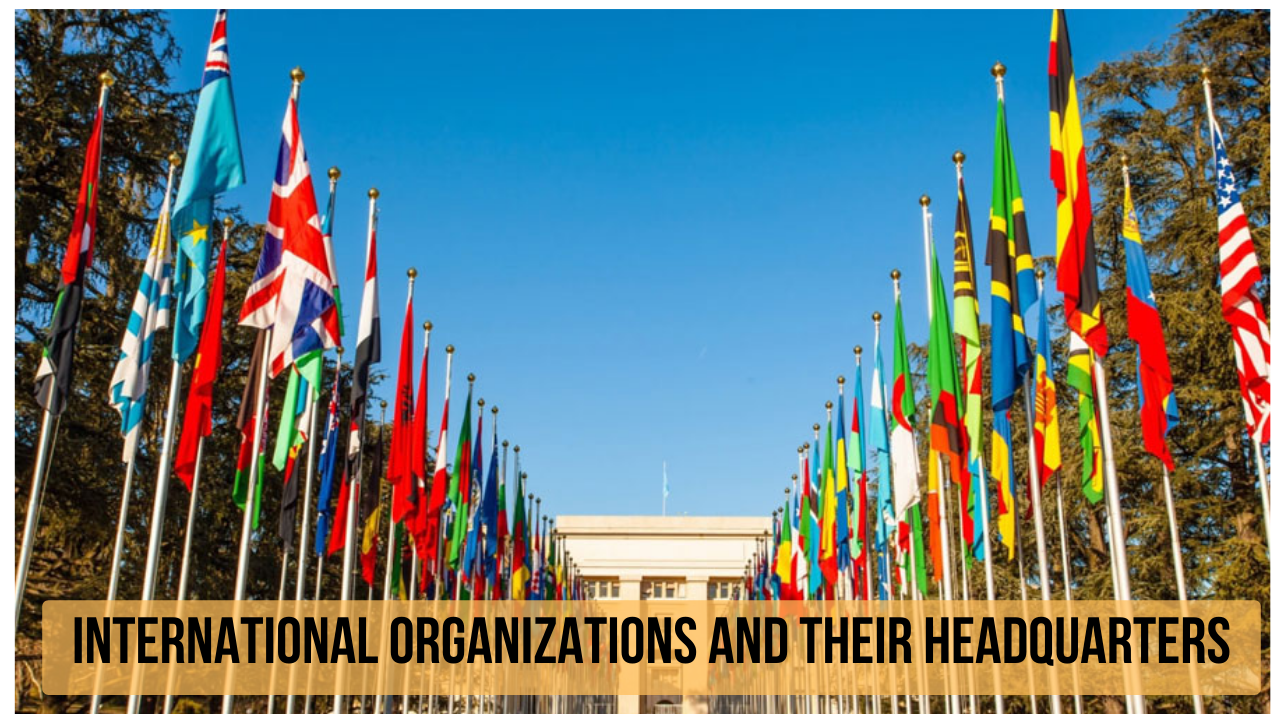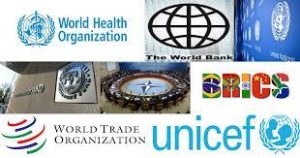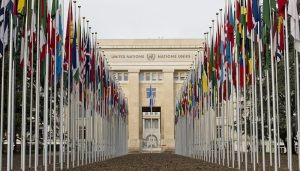
International Organisations and their Headquarters: International Organizations are vital entities consisting of member nations working together as a coalition to address global issues. They play a crucial role in fostering cooperation and collaboration among their member countries, promoting peace and mutual understanding. These organizations are dedicated to supporting the welfare of their member nations, striving to improve living conditions, economic growth, and social development.
Typically, an International HQ is established in a strategically chosen location, often in a major city of a country with significant global influence and connectivity. The choice of location is crucial as it needs to offer excellent infrastructure, access to international markets, a talented workforce, and a favorable business environment.
Due to their significant global impact and role in shaping international policies, knowledge about International Organizations and their headquarters is crucial for various competitive examinations, including UPSC, State PSC, and other similar tests. Being well-informed about these organizations helps individuals understand the dynamics of global governance and the efforts made to create a better world for all. Therefore, it is essential to stay updated with a comprehensive list of International Organizations and their headquarters to stay well-prepared for such competitive exams.

International organizations, also known as intergovernmental organizations (IGOs) or multinational organizations, are entities that consist of member nations from different countries coming together to address global challenges and promote cooperation on various issues. These organizations play a vital role in the modern world, facilitating communication, collaboration, and diplomacy among nations. They cover a wide range of areas, from international security and peacekeeping to economic development, humanitarian aid, environmental conservation, and more.
One of the primary objectives of International Organizations is to maintain international harmony and prevent conflicts among member countries. They act as platforms for dialogue, negotiation, and diplomacy, facilitating peaceful resolutions to global challenges.
Additionally, these organizations actively contribute to the development of developing countries by providing financial aid, technical assistance, and capacity-building programs. They aim to bridge the gap between developed and developing nations, fostering sustainable growth and reducing poverty.
International organizations are crucial in setting the global agenda, strengthening political ties, and supporting development projects worldwide. With far-reaching influence, they impact countries, legislation, and global prices. The table below explores various international organizations, their headquarters, and establishment years.
| Organization | Headquarters | Establishment Year |
| United Nations Development Programme (UNDP) | New York City, USA | 1965 |
| United Nations Environment Programme (UNEP) | Nairobi, Kenya | 1972 |
| United Nations Population Fund (UNPF) | New York City, USA | 1969 |
| United Nations Human Settlement Programme (UN-Habitat) | Nairobi, Kenya | 1978 |
| United Nations Children’s Fund (UNICEF) | New York City, USA | 1946 |
| World Food Programme (WFP) | Rome, Italy | 1961 |
| Food and Agriculture Organization (FAO) | Rome, Italy | 1945 |
| International Civil Aviation Organization (ICAO) | Montreal, Canada | 1947 |
| International Fund for Agricultural Development (IFAD) | Rome, Italy | 1977 |
| International Labour Organization (ILO) | Geneva, Switzerland | 1919 |
| International Monetary Fund (IMF) | Washington, DC, USA | 1944 |
| International Maritime Organization (IMO) | London, United Kingdom | 1948 |
| International Telecommunication Union (ITU) | Geneva, Switzerland | 1865 |
| United Nations Educational, Scientific and Cultural Organization (UNESCO) | Paris, France | 1945 |
| United Nations Industrial Development Organization (UNIDO) | Vienna, Austria | 1966 |
| World Tourism Organization (UNWTO) | Madrid, Spain | 1974 |
| Universal Postal Union (UPU) | Bern, Switzerland | 1874 |
| World Health Organization (WHO) | Geneva, Switzerland | 1948 |
| World Intellectual Property Organization (WIPO) | Geneva, Switzerland | 1967 |
| World Meteorological Organization (WMO) | Geneva, Switzerland | 1950 |
| World Bank | Washington, DC, USA | 1944 |
| Joint United Nations Programme on HIV/AIDS (UNAIDS) | Geneva, Switzerland | 1994 |
| United Nations High Commissioner for Refugees (UNHCR) | Geneva, Switzerland | 1950 |
| United Nations Institute for Disarmament Research (UNIDIR) | Geneva, Switzerland | 1980 |
| United Nations Institute for Training and Research (UNITAR) | Geneva, Switzerland | 1963 |
| United Nations Office for Project Services (UNOPS) | Copenhagen, Denmark | 1973 |
| United Nations Relief and Works Agency for Palestine Refugees (UNRWA) | Amman, Jordan | 1949 |
| United Nations System Staff College (UNSSC) | Turin, Italy | 2002 |
| United Nations University (UNU) | Tokyo, Japan | 1973 |
| UN Women | New York City, USA | 2010 |
| International Atomic Energy Agency (IAEA) | Vienna, Austria | 1957 |
| International Organization for Migration (IOM) | Geneva, Switzerland | 1951 |
| Organization for the Prohibition of Chemical Weapons (OPCW) | The Hague, Netherlands | 1997 |
| United Nations Framework Convention on Climate Change (UNFCCC) | Bonn, Germany | 1994 (Signed in 1993) |
| World Trade Organization (WTO) | Geneva, Switzerland | 1995 |
| International Trade Centre (ITC) | Geneva, Switzerland | 1964 |
| African Development Bank Group | Abidjan, Cote d’Ivoire | 1964 |
| African Union (AU) | Addis Abab, Ethiopia | 2002 |
| Amnesty International (AI) | London, United Kingdom | 1961 |
| Andean Community | Lima, Peru | 1969 |
| Arctic Council | Tromso, Norway | 1996 |
| Asia-Pacific Economic Cooperation (APEC) | Queenstown, Singapore | 1989 |
| Asian Development Bank (ADB) | Mandaluyong, Philippines | 1966 |
| Association of Caribbean States (ACS) | Port of Spain, Trinidad, Tobago | 1994 |
| Association of Southeast Asian Nations (ASEAN) | Jakarta, Indonesia | 1967 |
| Bank for International Settlements (BIS) | Basel, Switzerland | 1930 |
| Black Sea Economic Cooperation (BSEC) | Istanbul, Turkey | 1992 |
| Caribbean Community (CARICOM) | Georgetown, Guyana | 1973 |
| Central American Bank for Economic Integration | Tegucigalpa, Honduras | 1960 |
| Common Market for Eastern and Southern Africa (COMESA) | Lusaka, Zambia | 1994 |
| Commonwealth Secretariat | London, United Kingdom | 1965 |
| Council of Europe | Strasbourg, France | 1949 |
| Council of European Municipalities and Regions (CEMR) | Geneva, Switzerland | 1951 |
| Council of the Baltic Sea States (CBSS) | Stockholm, Switzerland | 1992 |
| Economic Community of West African States (ECOWAS) | Federal Capital Territory, Nigeria | 1975 |
| European Bank for Reconstruction and Development (EBRD) | London, United Kingdom | 1991 |
| European Central Bank (ECB) | Frankfurt, Germany | 1998 |
| European Free Trade Association (EFTA) | Geneva, Switzerland | 1960 |
| Association of European Parliamentarians with Africa (AWEPA) | Amsterdam, Netherlands | 1984 |
| European Space Agency (ESA) | Paris, France | 1975 |
| European Union (EU) | Brussels, Belgium | 1993 |
| Group of Eight (G8) | New York, USA | 1975 |
| G-15 Summit | Geneva, Switzerland | 1990 |
| Inter-American Development Bank (IDB) | Washington, DC, USA | 1959 |
| Intergovernmental Authority on Development (IGAD) | Djibouti, Djibouti | 1986 |
| International Atomic Energy Agency (IAEA) | Vienna, Austria | 1957 |
| International Civil Aviation Organization (ICAO) | Montreal, Canada | 1947 |
| International Chamber of Commerce (ICC) | Paris, France | 1919 |
| International Committee of the Red Cross (ICRC) | Geneva, Switzerland | 1863 |
| International Court of Justice (ICJ) | The Hague, Netherlands | 1945 |
| International Development Association (IDA) | Washington, DC, USA | 1960 |
| International Federation of Red Cross and Red Crescent Societies (IFRC) | Geneva, Switzerland | 1919 |
| International Finance Corporation (IFC) | Washington, DC, USA | 1956 |
| International Labour Organization (ILO) | Geneva, Switzerland | 1919 |
| International Olympic Committee (IOC) | Lausanne, Switzerland | 1894 |
| International Organization for Standardization (ISO) | Geneva, Switzerland | 1947 |
| International Peace Bureau (IPB) | Geneva, Switzerland | 1891 |
| International Seabed Authority (ISA) | Kingston, Jamaica | 1994 |
| International Service for Human Rights (ISHR) | Geneva, Switzerland | 1984 |
| Inter-Parliamentary Union | Geneva, Switzerland | 1889 |
| League of Arab States | Cairo, Egypt | 1945 |
| Multilateral Investment Guarantee Agency (MIGA) | Washington, DC, USA | 1988 |
| The Non-Aligned Movement (NAM) | Central Jakarta, Indonesia | 1961 |
| Nordic Council of Ministers | Copenhagen, Denmark | 1971 |
| North Atlantic Treaty Organization (NATO) | Washington, DC, USA | 1949 |
| Organization for Economic Co-operation and Development (OECD) | Paris, France | 1961 |
| Organization for Security and Co-operation in Europe (OSCE) | Vienna, Austria | 1975 |
| Organization of Arab Petroleum Exporting Countries (OAPEC) | Kuwait, Middle East | 1968 |
| Organization of the Islamic Conference (OIC) | Jeddah, Saudi Arabia | 1969 |
| Organization of the Petroleum Exporting Countries (OPEC) | Vienna, Austria | 1960 |
| Secretariat of the Pacific Community (SPC) | Noumea, New Caledonia | 1947 |
| South Asian Association for Regional Cooperation (SAARC) | Kathmandu, Nepal | 1985 |
| Unión Latina | Paris, France | 1954 |
| United Cities & Local Governments (UCLG) | Barcelona, Spain | 2004 |
| United Nations Economic and Social Commission for Asia and the Pacific (ESCAP) | Bangkok, Thailand | 1947 |
| United Nations Economic and Social Commission for Western Asia (ESCWA) | Beirut, Lebanon | 1973 |
| United Nations Environmental Program (UNEP) | Nairobi, Kenya | 1972 |
| United Nations Food and Agriculture Organization (FAO) | Rome, Italy | 1945 |
| United Nations High Commissioner for Human Rights (UNHCHR) | Geneva, Switzerland and New York City, USA | 1993 |
| United Nations Office on Drugs and Crime (UNODC) | Vienna, Austria | 1997 |
| United Nations International Research and Training Institute for the Advancement of Women (INSTRAW) | Santo Domingo, Dominican Republic | 1975 |
| United Nations Office for the Coordination of Humanitarian Affairs (OCHA) | Geneva, Switzerland and New York City, USA | 1991 |
| United Nations Relief and Works Agency for Palestine Refugees in the Near East (UNRWA) | Amman, Jordan | 1949 |
| Western European Union (WEU) | Paris, France | 1954 |
| World Federation of United Nations Associations (WFUNA) | Geneva, Switzerland and New York City, USA | 1946 |
| World Organization Against Torture (OMCT) | Geneva, Switzerland | 1985 |
| World Wide Fund for Nature (WWF) | Gland, Switzerland | 1961 |

1. Intergovernmental Organizations (IGOs): These are organizations created by sovereign states to address specific issues collectively. Examples include the United Nations (UN), World Health Organization (WHO), International Monetary Fund (IMF), World Bank, and World Trade Organization (WTO).
2. Non-Governmental Organizations (NGOs): While not composed of member states, NGOs are independent organizations that operate internationally to promote various causes such as human rights, environmental conservation, and humanitarian aid. Examples include Amnesty International, Greenpeace, and Doctors Without Borders.
3. Regional Organizations: These organizations focus on specific geographic regions and aim to address regional challenges. Examples include the European Union (EU), the African Union (AU), and the Association of Southeast Asian Nations (ASEAN).
Here is a list of International Organizations of which India is a Member. Despite the United States revoking India’s status from a Developing nation to a Developed nation, India still requires funds to support its states and run the world’s largest democracy. These organizations provide vital aid to India, making it crucial to remember their memberships.
| International Organization | Headquarters | Foundation Year |
| AALCO – Asian-African Legal Consultative Organization | New Delhi | 1956 |
| ADB – Asian Development Bank | Manila, Philippines | 1956 |
| AfDB – African Development Bank (non-regional members) | Tunis, Tunisia | 1964 |
| AG – Australia Group | Brussels, Belgium | 1985 |
| ASEAN Regional Forum – The Association of Southeast Asian Nations | Jakarta, Indonesia | 1967 |
| BIMSTEC – Bay of Bengal Initiative for Multi-Sectoral Technical and Economic Cooperation | Dhaka, Bangladesh | 1997 |
| BIS – Bank for International Settlements | Basel, Switzerland | 1930 |
| BRICS – Brazil, Russia, India, China, and South Africa | Shanghai, China | 2006 |
| CoN – Commonwealth of Nations | London, UK | 1931 |
| CERN – European Organization for Nuclear Research | Geneva, Switzerland | 1954 |
| CP – Colombo Plan | Colombo, Srilanka | 1950 |
| EAS – East Asia Summit | Colombo, Sri Lanka | 1950 |
| FAO – Food and Agriculture Organization of the United Nations | Rome, Itlay | 1945 |
| G-15 – Group of 15 | Geneva, Switzerland | 1989 |
| G-20 – Group of 20 | Cancun, Mexico | 1999 |
| G-77 – Group of 77 | New York | 1964 |
| IAEA – International Atomic Energy Agency | Vienna, Austria | 1957 |
| IBRD – International Bank for Reconstruction and Development (World Bank) | Washington DC, US | 1944 |
| ICAO – International Civil Aviation Organization | Montreal, Canada | 1944 |
| ICC – International Chamber of Commerce | Paris, France | 1919 |
| IDA – International Development Association | Washington DC | 1950 |
| IEA – International Energy Agency | Paris, France | 1974 |
| IFAD – International Fund for Agricultural Development | Rome, Italy | 1977 |
| IFC – International Finance Corporation | Washington DC, US | 1956 |
| ILO – International Labour Organization | Geneva, Switzerland | 1919 |
| IMF – International Monetary Fund | Washington DC, US | 1945 |
| IMO – International Maritime Organization | London, UK | 1948 |
| IMSO – International Mobile Satellite Organization | London, UK | 1999 |
| Interpol – International Criminal Police Organization | Lyon, France | 1923 |
| IOC – International Olympic Committee | Lausanne, Switzerland | 1894 |
| IPEEC – International Partnership for Energy Efficiency Cooperation | Paris, France | 2009 |
| ISO – International Organization for Standardization | Geneva, Switzerland | 1947 |
| ITSO – International Telecommunications Satellite Organization | Washington DC | 1964 |
| ITU – International Telecommunication Union | Geneva, Switzerland | 1864 |
| ITUC – International Trade Union Confederation (the successor to ICFTU (International Confederation of Free Trade Unions) and the WCL (World Confederation of Labour)) | Brussels, Belgium | 2006 |
| MTCR Missile Technology Control Regime | Japan | 1987 |
| NAM – Non-Aligned Movement | Jakarta, Indonesia | 1961 |
| OPCW – Organisation for the Prohibition of Chemical Weapons | Hague, Netherland | 1997 |
| PCA – Permanent Court of Arbitration | Hague, Netherland | 1899 |
| PIF – Pacific Islands Forum (partner) | Suva, Fiji | 1971 |
| SAARC – South Asian Association for Regional Cooperation | Kathmandu, Nepal | 1985 |
| SACEP – South Asia Co-operative Environment Programme | Colombo, Sri Lanka | 1982 |
| SCO – Shanghai Cooperation Organisation (member) | Beijing, China | 1996 |
| UN – United Nations | New York | 1945 |
| UNAIDS – United Nations Programme on HIV/AIDS | New York | 1994 |
| UNESCO – United Nations Educational, Scientific and Cultural Organisation | London, Uk | 1946 |
| WHO- World Health Organization | Geneva, Switzerland | 1948 |

Remembering the headquarters and names of international organizations can be quite challenging. To assist you, we have devised tricks to remember the important names of organizations and their headquarters. Take a look at the tricks below:
|
Tips and Tricks to Remember International Headquarters |
|
| Headquarters | Organizations |
| Geneva | Starting with “World” and ending with “Organization” |
| 1. World Health Organisation (WHO) | |
| 2. World Meteorological Organization (WMO) | |
| 3. World Intellectual Property Organization (WIPO) | |
| Washington DC | Organization associated with “money” |
| 1. International Monetary Fund (IMF) | |
| 2. World Bank | |
| Vienna | Organization related to “Industrial development, Petroleum, and atomic research” |
| 1. United Nations Industrial Development Organization (UNIDO) | |
| 2. International Atomic Energy Agency (IAEA) | |
| 3. Organization of the Petroleum Exporting Countries (OPEC) | |
| Paris | Organizations associated with “Education and economy” |
| 1. International Council on Monuments and Sites (ICOMOS) | |
| 2. United Nations Educational, Scientific and Cultural Organisation (UNESCO) | |
| 3. Organisation for Economic Co-operation and Development (OECD) | |
The International Solar Alliance is the first international organization headquartered in India, and it has the United Nations as its strategic partner. India is also a member or founding member of several other international organizations, including AALCO, ADB, AfDB, AG, ASEAN Regional Forum, BIMSTEC, BRICS, CERN, FAO, IAEA, IBRD, ICAO, IMO, and more.
The United Nations (UN) is considered the world's largest intergovernmental organization. It is an international organization with 193 member states, working towards promoting international cooperation, peace, security, and development. The UN addresses various global issues such as climate change, poverty, human rights, and humanitarian crises through its specialized agencies, programs, and initiatives. However, please note that the information might change over time, so it's always good to verify the latest data for the most up-to-date information.
The first international organization headquartered in India is the International Solar Alliance (ISA). It was launched on November 30, 2015, in Paris, during the 21st Conference of Parties (COP 21) of the United Nations Framework Convention on Climate Change (UNFCCC). The ISA is a coalition of countries that aims to promote the use of solar energy and enhance solar capacity in member countries. Its primary objective is to address the challenges of climate change by reducing dependence on fossil fuels and promoting sustainable energy solutions. The ISA's headquarters is located in Gurugram, Haryana, India.
The International Telecommunication Union (ITU) is considered the oldest international organization in the world. It was established on May 17, 1865, and is a specialized agency of the United Nations (UN). The ITU is responsible for coordinating global telecommunication networks and services, allocating radio-frequency spectrum, and developing technical standards to ensure seamless international communication. The ITU has played a significant role in shaping the development and standardization of telecommunication technologies over the years.
<div class="new-fform">
</div>